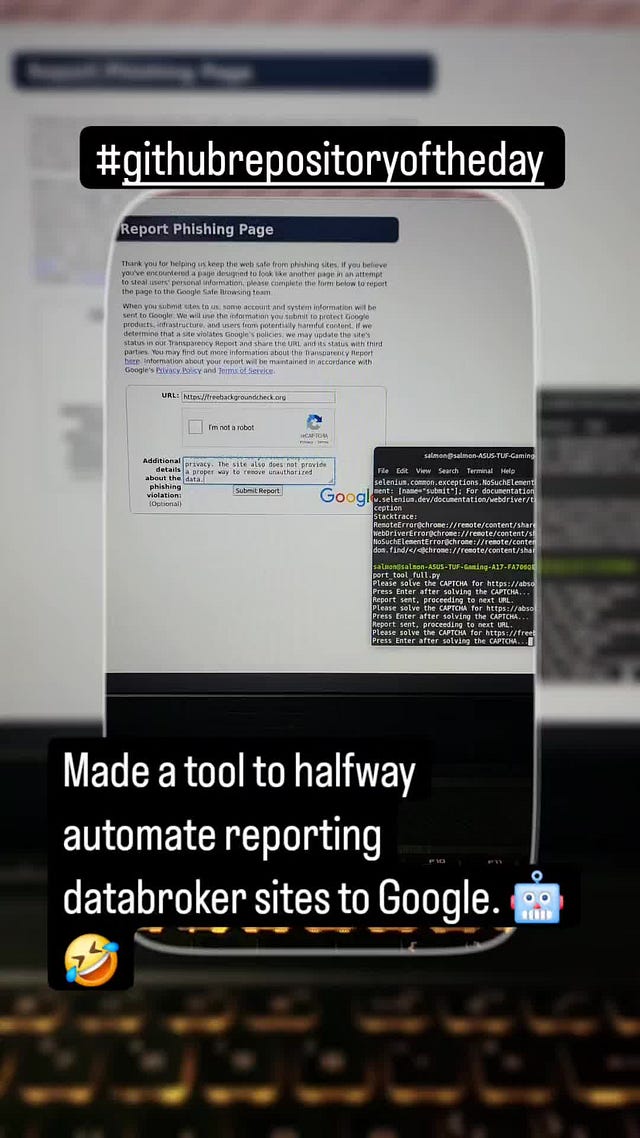The Struggle for Privacy:
Coercion, Data Brokers, and a Global Agenda
In today’s world, managing personal information has become increasingly complicated. There was a time when individuals could easily opt out of data broker websites, using simple lists and forms to remove their information. But now, people are faced with more complex systems, with numerous barriers preventing them from fully reclaiming their privacy.
Coercion Through Privacy Exploitation
What we’re seeing today is not just about confusing opt-out processes; it’s about coercion. Data brokers, allowed to operate freely, scrape and sell personal data with little oversight. This creates a system where individuals feel pressured to pay for privacy protections that should be a basic right.
Companies like Mozilla, which once championed privacy, now offer paid services for enhanced privacy protections. After its acquisition by Google, Mozilla's approach seems to have shifted, and it benefits from the existence of these data brokers. Individuals aren’t directly paying the data brokers to remove their data, but they are paying platforms like Mozilla, which have positioned themselves as the solution to the very problem they help perpetuate.
While Twitter has implemented similar paid models for protection, it's just one piece of a broader landscape where multiple platforms across the tech world are engaging in these tactics.
A Global System of Data Exploitation
This isn’t just a domestic issue—data brokers operate internationally, with buyers from various countries purchasing sensitive information like personal IDs and financial data. As data moves freely across borders, individuals often feel powerless, especially when the brokers themselves are located overseas, beyond the reach of local regulations.
This global trade of personal data leaves people feeling vulnerable. With their information being exposed, they may find themselves begging for more surveillance and control in an effort to protect their privacy. Ironically, this push toward stricter oversight, including systems like KYC (Know Your Customer) protocols, may lead to even greater invasions of privacy, much like the surveillance-heavy systems seen in countries like China.
Broken Systems by Design
The frustration is only compounded when users attempt to opt out of these data broker websites, only to find that many are deliberately broken. Websites like InfoTracer and FreeBackgroundCheck.org seem to make the process nearly impossible. Users report running into repeated errors such as, “Seems like you are too fast on the request confirmation. Please wait about 5 seconds and try again,” no matter how long they wait or how carefully they follow the steps.
These websites often feature broken links, malfunctioning forms, and outdated protocols—issues that seem to be built into the system. It’s not accidental; the difficulties are designed to prevent people from successfully removing their data. As a result, users feel trapped, with their data still being exposed and sold.
The Bigger Picture: Data Brokers and Tech Platforms
While data brokers are often seen as the face of the problem, they are only part of a larger system. The real issue is how this is part of a global agenda to collect as much personal data as possible, pushing people to the point where they feel they must beg for protection. These brokers are allowed to operate freely, and tech platforms indirectly benefit from the fear and anxiety this data exploitation creates.
Since its acquisition by Google, Mozilla has shifted from its privacy-first focus, offering paid privacy services as a way for users to protect themselves. This cycle of coercion pushes people to pay for privacy protections that they shouldn’t have to pay for in the first place. Platforms position themselves as the solution to the very problems they’ve helped foster by allowing data brokers to thrive.
While Twitter follows similar practices by offering paid protections through its subscription model, it’s just a supporting example of how platforms across the tech industry are capitalizing on users’ fears. The issue isn’t limited to any one company or platform—it’s a systemic problem.
The End Result: Paying for Privacy
At the core of all this is a troubling shift where privacy is becoming a commodity. Users, whether they are privacy-focused individuals like Firefox users or those from varying political spectrums, are being pushed into a world where privacy isn’t guaranteed, but rather something that must be purchased.
As people struggle to remove their information from data broker websites, they often find themselves cornered into paying for privacy protections. The fear of their data being exposed drives them to seek out paid solutions, whether from platforms like Mozilla or through other protective services. And with the global nature of data trading, users feel increasingly vulnerable, unsure of who holds their information or how it’s being used.
What Can Be Done?
Despite these challenges, there are still steps individuals can take to push back:
Use Social Media to Apply Pressure: Publicly calling out data brokers and tech platforms on social media can sometimes force companies to act. Companies are more likely to respond when their reputation is at stake.
Document Everything: Keep detailed records of every opt-out attempt and error message. This can be crucial if you need to escalate your issue or pursue legal action.
File Complaints with Government Agencies: If data brokers continue to ignore opt-out requests, filing complaints with the FTC or your State Attorney General is a necessary step.
Consult Legal Experts: Depending on your location, privacy laws like the GDPR or CCPA may give you grounds to take legal action.
Report to Google and Provide a List of Offending Companies: You can file reports with Google for links that expose your personal information. Google allows you to request the removal of specific URLs that contain sensitive information. It’s also important to provide a list of companies and data brokers that are actively making it difficult to remove your data. By reporting this information to Google, you can highlight the scale of the problem and pressure them to take action on those links.
Conclusion
The current landscape of privacy is complex, with no single issue or actor to blame. Data brokers, tech platforms, and global data exploitation all contribute to a system where individuals feel coerced into paying for privacy. While data brokers are at the forefront, the bigger issue lies with the tech platforms that allow these practices to continue, positioning themselves as the solution to a problem they’ve helped create.
As people’s personal information is exposed, sold, and exploited, privacy becomes something people feel they have to buy. The broader challenge lies in pushing back against a system that profits from fear and control, and in reclaiming privacy as a fundamental right, not a luxury.

 Tiktok failed to load.
Tiktok failed to load.Enable 3rd party cookies or use another browser
https://github.com/moderatedan/Databroker-Reporting-Tool «
Databroker Reporting Tool
An automation tool designed to help users report data broker websites that display and sell personal information. By collectively reporting these sites to Google Safe Browsing, we can help protect our privacy without relying on costly services that can still be prone to leaks. Overview
This Python tool helps automate the process of reporting data broker websites to Google Safe Browsing, aiming to protect user privacy. By reporting these websites, users can reduce the unauthorized sale of personal data without relying on expensive data removal services. How it Works
The tool automatically submits URLs to the Google Safe Browsing report form.
Users can solve CAPTCHA challenges manually or use the Buster CAPTCHA solver for automation.
Setup Instructions
Install Firefox and the Buster CAPTCHA Solver add-on.
Install dependencies (selenium and twocaptcha).
Download or clone this repository.
Usage
Update the URLs in the captcha_report_tool_full.py file as needed.
Run the script using the following command:
bash
python3 captcha_report_tool_full.py
When prompted, solve the CAPTCHA manually, or let Buster solve it for you.
Why Use This Tool?
By reporting these data broker sites, you help reduce the exposure of personal data. Using this tool collectively can provide a stronger response than relying solely on paid services, which are still vulnerable to data leaks.
If enough people report these privacy-violating brokers, it will raise awareness and pressure organizations to act, making the web safer for everyone. By doing this together, we can protect our data more effectively.
Comment
byu/greatCelery from discussion
inprivacy
pseudonym gave InfoTracer 1 star via @ Trustpilot https://trstp.lt/RnSr554i2
customer gave InfoTracer 1 star via @ Trustpilot https://trstp.lt/3K17g0CBE
https://www.scamadviser.com/check-website/infotracer.com
https://www.sitejabber.com/reviews/freebackgroundcheck.org#1
Decriminalizing Prostitution:
In today’s high-pressure world, many men, especially those who are married, poor, or feel unattractive, struggle with finding healthy outlets for their frustrations. These unaddressed frustrations often lead to destructive behaviors like domestic violence or even rape, which then fuels debates around abortion and reproductive rights. By legalizing or de…
Fine of the Times! Cops bleed the state, & you Pay for it!
http://www.dbusiness.com/January-February-2011/Fine-of-the-Times/#.VuWv9snD_qA
Pressure Tumblr To Stop Mass Terminating Our Accounts!
Pressure Tumblr To Stop Mass Terminating Our Accounts!






